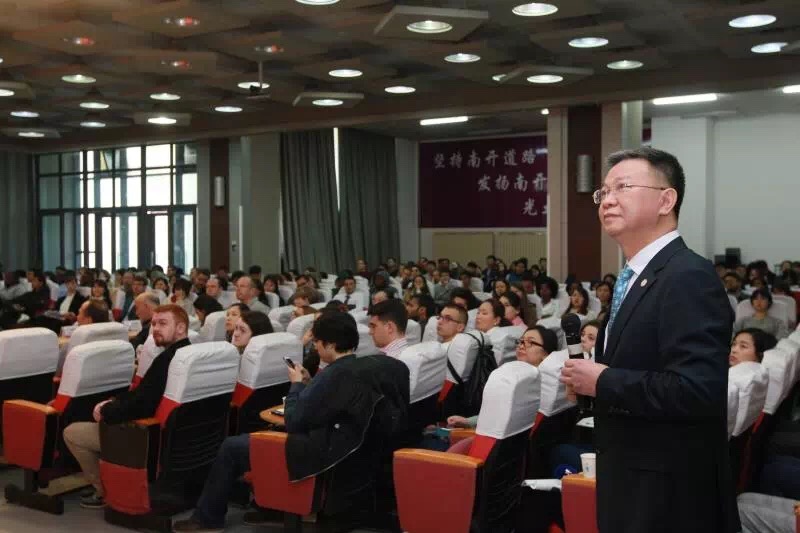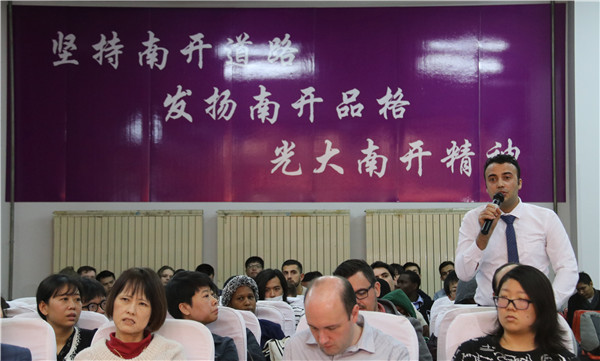
Nankai University held a thematic symposium on the recently concluded 19th National Congress of the Communist Party of China (CPC) for foreign experts and overseas students of the University on November 3. Yan Chunhua, Academician of the Chinese Academy of Sciences and Vice President of Nankai University, delivered a lecture in English themed “To build a Community with a Shared Future for Mankind and Create a Bright Tomorrow for All.” The lecture was attended by more than 200 foreign experts and overseas students from nearly 70 countries and regions.

Yan Chunhua introduced an overview of the 19th National Congress of the CPC, the spirit and highlights of the Party report as well as the current task of building a world-class university and first-class disciplines at Nankai University. He said, “In the past five years, China has made tremendous achievements not only in the economic field, but also in various other fields such as politics, culture, society and ecology. ...” Yan Chunhua also explained some key concepts such as “the five-sphere integrated plan,” “the four-pronged comprehensive strategy” and “innovative, coordinated, green, open and shared development.” He said that in the past five years we have made a series of visible changes. Taking the rural areas in Tianjin as an example, rubbish is properly collected and handled; a batch of heavily polluting enterprises have been shut down with pollutant emissions being strictly controlled. As a result, the number of days with good air quality has risen markedly. Moreover, rural residents have been fully covered by the rural medical insurance system which enables them to enjoy the same benefits as urban residents.
“China's confidence lies in its courage to show real China,” said Yan Chunhua; “we have no longer treated foreign experts, scholars and students as guests by showing them just the good side. We have started to show them a true China. We are developing fast, but also faced with problems.” Yan Chunhua explained that the key societal challenges facing China have shifted in the past few decades. Unlike 30 years ago, people’s material needs are now being consistently met and they are able to pursue culture and art. The key societal challenge now is inequalities in development across the country. “We are working hard to deal with these issues in the hope that we can work together to build a beautiful China. What is meant by ‘beautiful’ is not only clean air and natural scenery, but includes all-round development of free beings,” he added.

The lively lecture aroused great interest and resonated with the participants. Liu Zhengxi, an international student from Egypt who is currently studying at the College of Chinese Language and Culture, said, “Both China and Egypt are ancient civilizations. China is my second hometown which has grown rapidly in recent years, while Egypt is still facing many major problems. We need to learn from China. The ‘Belt and Road’ initiative is very popular in Egypt, and we have already enjoyed the benefits of this initiative. For example, the outbound travel to Egypt has increased by 10%. As President Xi Jinping said, China and Egypt are good friends. We believe that with the help of China Egypt will have a better future.”
Phillip Ramon Bryant, a medical expert from the School of Medicine, said, “The lecture is exciting and encouraging. It is so informative that we can better understand philosophy of the CPC governance. I am greatly touched by the fact that the people-centered concept for development has been mentioned quite a few times in the 19th CPC National Congress report. I am sure that the Chinese people will live a better life as guided by this philosophy.”

In the question session, Carl Karl, a PhD student at the Business School, and other fellow participants asked questions regarding the future role that China will play in the international arena after the 19th National Congress of the CPC, the relationship between the development of China and the future of the world, and Marxism in China.
Currently, Nankai University has nearly 800 foreign experts and 3,000 overseas students.
